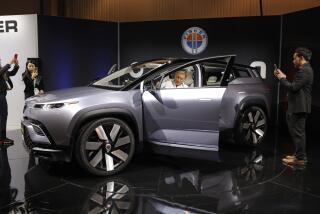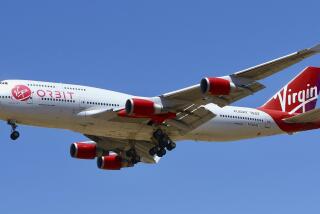Saturn’s new orbit
- Share via
From the time it was conceived by General Motors in the early 1980s, Saturn has always been a “different kind of car company.” That difference may soon become more profound. Last week, GM announced an agreement to sell Saturn to Penske Automotive Group, which bought the brand but not the factories that make its cars. Instead, Penske plans to outsource all of the manufacturing. In other words, Saturn will be the first carmaker that doesn’t actually make cars. As radical as that sounds, it’s more of an evolution than a revolution for the automobile industry. But the changes will yield a company whose strategy is the mirror image of its original mission to help Detroit beat Tokyo.
As we noted in an editorial about Saturn last month, the company’s initial purpose was to help GM compete in the compact-car segment by borrowing some of Japan’s carmaking techniques (e.g., more collaboration and less mind-numbing repetition). But as its models expanded, Saturn’s production eventually shifted to conventional GM plants as well as affiliated factories around the globe. The new version of the Saturn Vue, for example, was designed in Germany and built in Mexico. Penske will contract with GM to continue producing the Vue and two other models for two years, but then is expected to pick a new manufacturing partner that specializes in small, fuel-efficient cars -- a category that has never been the strong suit for any U.S.-based automaker.
Most car manufacturers already rely on subcontractors to supply key elements, such as brakes and transmissions. Penske is simply taking that trend to its logical extreme. And before Americans lament the potential loss of U.S. manufacturing jobs if and when every Saturn is made somewhere else, they should remember that the process works both ways. Foreign automakers have built numerous factories in the U.S., and much of the work on GM’s erstwhile Hummer brand will remain here even after its sale to a Chinese industrial firm. In addition, the deal promises to save thousands of jobs at as many as 350 Saturn dealerships -- more jobs, in all likelihood, than can be found at Saturn’s factories.
One irony in Saturn’s latest transformation is that it’s happening because the Obama administration pressed GM to shed more brands in order to receive a federal bailout. And so, 15 years removed from its peak sales and laboring to turn a profit, Saturn will soon be competing with the company that created it -- and almost certainly doing so with imported vehicles. It’s safe to say that this isn’t what GM meant by “a different kind of car company.”






